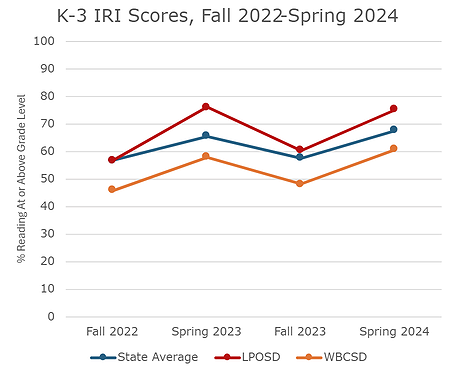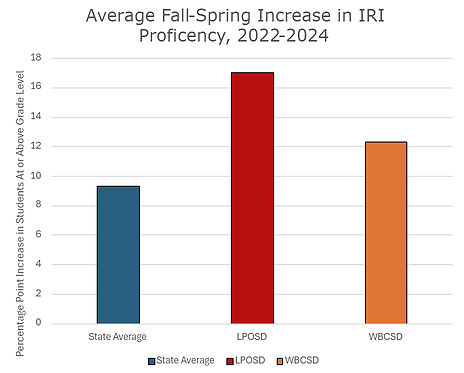A gateway to learning — LPOSD sees literacy as an unavoidable stepping stone
ERIC WELCH | Hagadone News Network | UPDATED 8 months, 3 weeks AGO
Lake Pend Oreille School District has a simple mantra — everyone graduates a reader. Executing that objective, however, is hardly straightforward.
“That is our No. 1 goal — that every student in this district can graduate with the ability to read and then do whatever they want with that life skill,” said Lisa McElroy, LPOSD K-12 instructional coach and literacy lead.
The district’s initiative, which places an emphasis on identifying struggling students and providing targeted intervention, came forth last year after Idaho legislators strengthened requirements for dyslexia support.
House Bill 731 was enacted in 2022, and mandates dyslexia screening and evidence-based interventions for K-5 students.
According to McElroy, the measure encouraged the district to bolster its already substantial literacy support system.
“We took the requirement of the law and scaled it up significantly,” McElroy said.
How are struggling readers supported?
First, the district uses assessments to identify students that need reading support.
“We don't just screen students K-5, we screen students all the way through high school,” explained McElroy.
According to McElroy, the district emphasizes the importance of verbal communication in reading assessment.
“Listening to our students read has allowed us to ‘catch’ those who may have flown under the radar,” she explained.
To identify and respond to deficiencies as soon as possible, LPOSD maintains a spreadsheet system that tracks each student’s progress on a monthly basis.
“That is something significant that we're doing differently than other districts,” McElroy said.
Once a student who is struggling has been identified, faculty intervenes to support the learner and bring them up to speed.
“We really have to figure out, ‘where's your hang up?’ and then focus on that and build from there,” said McElroy.
McElroy emphasized the importance of specific, targeted exercises and explained that simply assigning more independent reading isn’t an effective approach.
“Reading extra doesn't move the needle for a struggling reader,” said McElroy.
To help faculty learn those techniques, LPOSD’s team of instructional coaches organizes professional development opportunities.
According to McElroy, district staff lead workshops and plan visits to conferences year-round; this July, McElroy took a group of teachers to an early literacy symposium hosted at the University of Idaho.
“Our teachers are so diligent and so committed,” said McElroy.
“Our teachers have really just grabbed on to that goal and personalized it.”
Has the process been working?
In the fall and spring of each year, the Idaho Department of Education administers the Idaho Reading Indicator — a standardized test for all K-3 public school students.
This past spring, 74.4% of assessed LPOSD students read at or above grade level, placing the district higher than the state average of 66.5%
Out of 167 districts and charters in the state, LPOSD ranked No. 46. In a pool of the top 25 largest districts in Idaho, the district was No. 6.
Because the IRI is biannual, fall to spring improvement can also be tracked; examining this change may better reflect the efficacy of instructional practices throughout the year.
In this metric last year, LPOSD demonstrated a 13.9 percentage point jump — a figure strong enough to tie for No. 3 in the pool of 25.
“It is phenomenal,” Superintendent Dr. Becky Meyer said of the growth. She praised the effort of faculty for the improvement.
“The teacher in the classroom makes all the difference,” Meyer added. “They never give up on a kid — ever.”
What makes literacy critical?
The reason why promoting reading skills is crucial, according to McElroy, is that independent literacy is “the gatekeeper for all other subject areas.”
“Traditionally, you learn to read from K-3,” said McElroy. “From fourth grade and beyond, you’re reading to learn.”
Without the ability to consistently comprehend text, learning any subject is made significantly more difficult.
For McElroy, who has spent more than 25 years in public education, the drive to support struggling readers is personal.
“Two of my sons are dyslexic,” said McElroy. “I understand the importance of reading from an educator’s standpoint, but then also as a mom.”
“The confidence it gives kids when they learn to read, it's almost something that you can't describe,” she added.
“It's really, really cool.”
MORE FRONT-PAGE-SLIDER STORIES

Book vending machine arrives at Farmin Stidwell Elementary
Bonner County Daily Bee | Updated 1 week, 3 days ago
ARTICLES BY ERIC WELCH

Sandpoint City Council approves proposal to shrink area of impact by 70%
The proposal to reduce the city’s area of impact originally appeared before Sandpoint’s planning and zoning commission in March. The body decided to advise city councilors to bring a new 3.4-square-mile area — down from the existing 12.3-square-mile zone — to Bonner County for final approval.

Sandpoint’s top students plan to pursue aeronautics careers
You don’t become one of your class's top two students without being a “doer.” Dail and Bailey exemplify the term, each acting as a team captain for their respective sports — tennis and volleyball.

U.S. Army Corps of Engineers shares latest Albeni Falls Dam timeline
When the No. 3 gate is operable this summer, Albeni Falls Dam will once again have a spare spillway gate that can be implemented in an emergency. USACE Seattle District Commander Col. Kathryn Sanborn told attendees of Thursday’s meeting that even with a set of defective gates and no spare, the risk of a flood event or any threat to public safety is “very, very minimal.”







